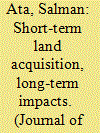| Srl | Item |
| 1 |
ID:
119920


|
|
|
|
|
| Publication |
2013.
|
| Summary/Abstract |
This research reports on empirical findings of remote Pitcairn Island, the last remaining British Overseas Territory in the Pacific. It uses a qualitative methodology to discuss the island's potential for tourism development while recognising the issues and challenges faced by many small island developing states. However, as a sub-national island jurisdiction Pitcairn presents a number of issues unique to its temporal socio-political development and its centre periphery relationship with the metropole. The concept 'decolonising without disengaging' is posited to argue sub-national island jurisdictions are places/spaces of innovative, creative and differentiated development processes that offer interesting departures from the conventional realms of sustainable discourse and island development. This concept is posited as a strategy of empowerment whereby autonomy without sovereignty does not necessarily hinder the development of tourism industries.
|
|
|
|
|
|
|
|
|
|
|
|
|
|
|
|
| 2 |
ID:
176490


|
|
|
|
|
| Summary/Abstract |
With much fanfare, Ghana's Jubilee Oil Field was discovered in 2007 and began producing oil in 2010. In the six coastal districts nearest the offshore fields, expectations of oil-backed development have been raised. However, there is growing concern over what locals perceive to be negative impacts of oil and gas production. Based on field research conducted in 2010 and 2015 in the same communities in each district, this paper presents a longitudinal study of the impacts (real and perceived) of oil and gas production in Ghana. With few identifiable benefits beyond corporate social responsibility projects often disconnected from local development priorities, communities are growing angrier at their loss of livelihoods, increased social ills and dispossession from land and ocean. Assuming that others must be benefiting from the petroleum resources being extracted near their communities, there is growing frustration. High expectations, real and perceived grievances, and increasing social fragmentation threaten to lead to conflict and underdevelopment.
|
|
|
|
|
|
|
|
|
|
|
|
|
|
|
|
| 3 |
ID:
165926


|
|
|
|
|
| Summary/Abstract |
Pakistan provides seasonal hunting permits to the rulers of Gulf countries for hunting of Asian Houbara bustard (Chlamydotis macqueenii) in different parts of the country. This research deals with (transnational) seasonal land acquisition of different rangelands/deserts of the Punjab province of Pakistan. So far, no comprehensive research has been conducted in Pakistan on this issue. This research attempts to address the impact of seasonal land grabbing by the foreigners on livelihood assets of local stakeholders in South Punjab, Pakistan. Based on the idea of ‘control grabbing’, this research uses ‘sustainable livelihood framework’ as an analytical framework. Quantitative and qualitative data were acquired from three (out of a total nine) randomly selected hunting sanctuaries in the districts of Rajanpur and Dera Ghazi Khan. The results revealed that natural assets of local population (agricultural land and rangeland) are adversely affected during the entire hunting season. Limited access to natural assets (especially livestock fodder) has long-term negative impacts on livelihood diversification of the locals as the number of livestock – one of the most important assets of respondents – is continuously decreasing in the case study area. We recommend that land enclosure should be restricted to a limited area for a limited time, and that the Government should develop an effective monitoring and evaluation system.
|
|
|
|
|
|
|
|
|
|
|
|
|
|
|
|